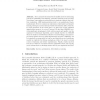Free Online Productivity Tools
i2Speak
i2Symbol
i2OCR
iTex2Img
iWeb2Print
iWeb2Shot
i2Type
iPdf2Split
iPdf2Merge
i2Bopomofo
i2Arabic
i2Style
i2Image
i2PDF
iLatex2Rtf
Sci2ools
116
click to vote
EVOW
2009
Springer
2009
Springer
Evolutionary Optimization Guided by Entropy-Based Discretization
The Learnable Evolution Model (LEM) involves alternating periods of optimization and learning, performa extremely well on a range of problems, a specialises in achieveing good results in relatively few function evaluations. LEM implementations tend to use sophisticated learning strategies. Here we continue an exploration of alternative and simpler learning strategies, and try Entropy-based Discretization (ED), whereby, for each parameter in the search space, we infer from recent evaluated samples what seems to be a ‘good’ interval. We find that LEM(ED) provides significant advantages in both solution speed and quality over the unadorned evolutionary algorithm, and is usually superior to CMA-ES when the number of evaluations is limited. It is interesting to see such improvement gained from an easily-implemented approach. LEM(ED) can be tentatively recommended for trial on problems where good results are needed in relatively few fitness evaluations, while it is open to several rou...
Artificial Intelligence | EVOW 2009 | Function Optimization | Learning Strategies | Sophisticated Learning Strategies |
| Added | 19 May 2010 |
| Updated | 19 May 2010 |
| Type | Conference |
| Year | 2009 |
| Where | EVOW |
| Authors | Guleng Sheri, David W. Corne |
Comments (0)

